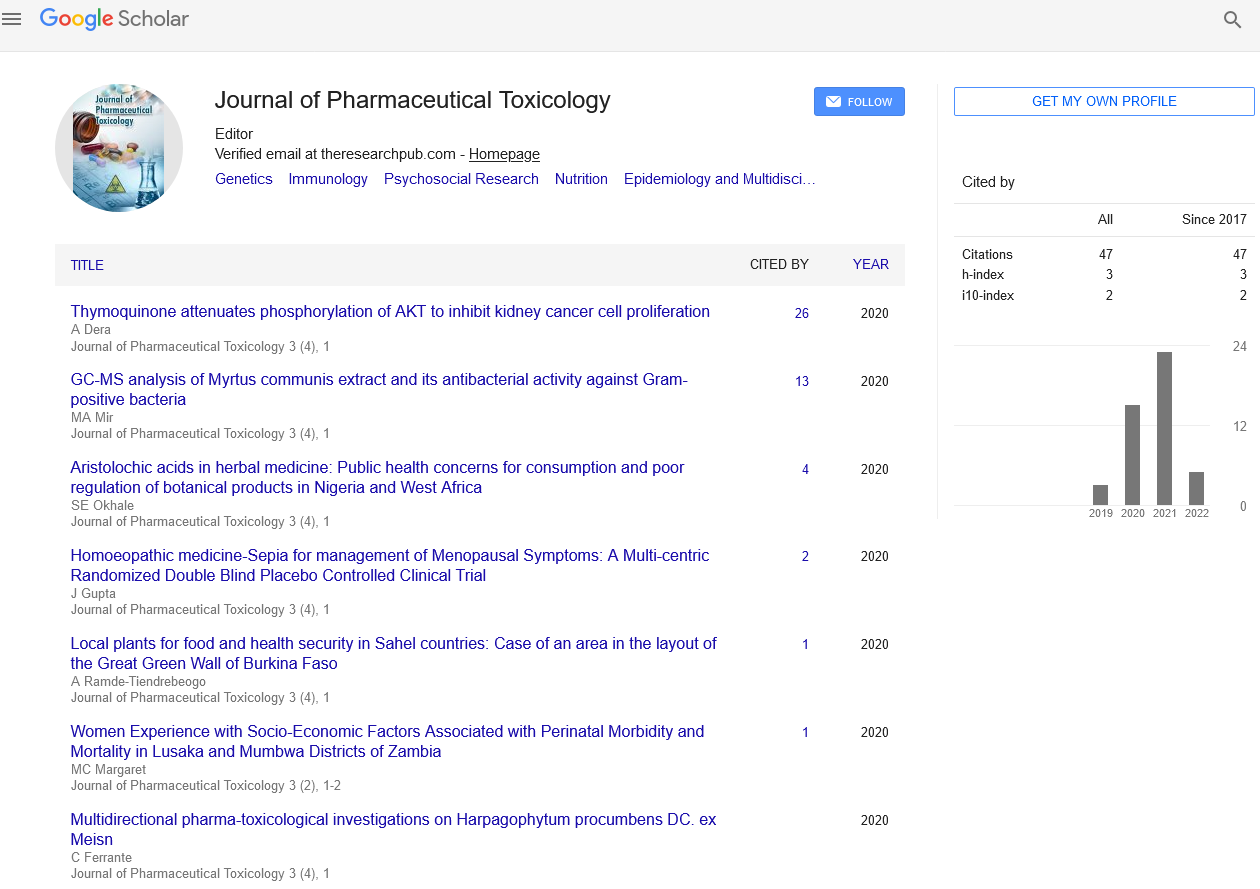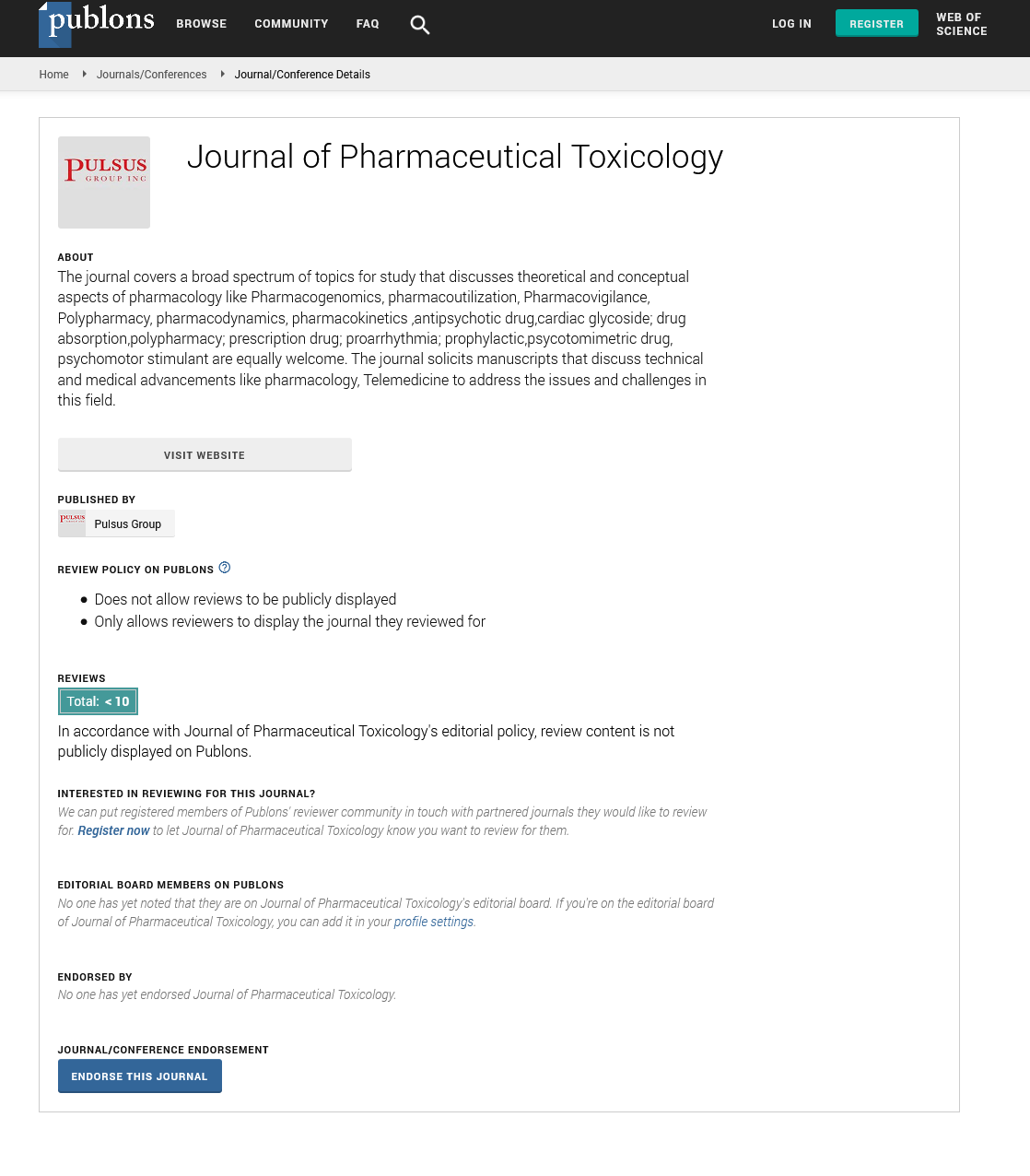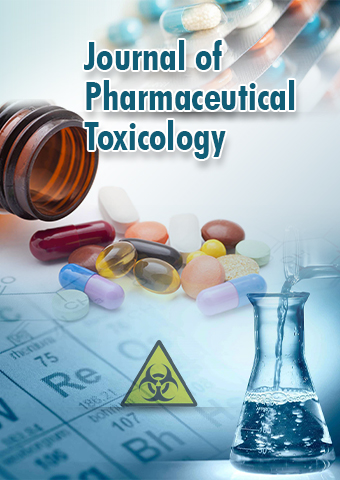Research Article - Journal of Pharmaceutical Toxicology (2023) Volume 6, Issue 2
Revolutionizing Medicine: The Role of Pharmaceuticals in Healthcare
Greenery Ancola*
Department of Pathology, University of state capital, Australia
Department of Pathology, University of state capital, Australia
E-mail: greeneryancola.22@gmail.com
Received: 03-April-2023, Manuscript No. jpt-23-94552; Editor assigned: 5-April-2023, PreQC No. jpt-23-94552 (PQ); Researched: 19-April-2023, QC No. jpt-23-94552; Revised: 21-April-2023, Manuscript No. jpt-23- 94552 (R); Published: 28-April-2023, DOI: 10.37532/jpt.2023.6(2).33-35
Abstract
Pharmacogenomics is an emerging field that combines pharmacology and genomics to create personalized medication regimens based on a patient’s genetic profile. By analyzing an individual’s DNA, pharmacists can predict how they will respond to certain drugs, identify potential adverse reactions, and tailor treatment accordingly. This article will explore the science behind pharmacogenomics, its potential applications in pharmacy practice, and the ethical considerations surrounding genetic testing and personalized medicine. The United States is in the midst of an opioid epidemic, with millions of people addicted to prescription painkillers and illicit drugs like heroin and fentanyl. Pharmacists play a crucial role in preventing and managing opioid abuse, from monitoring prescription drug databases to providing naloxone overdose reversal kits. This article will examine the scope of the opioid crisis, the role of pharmacists in addressing it, and the challenges they face in balancing patient care with opioid safety and addiction prevention.
Keywords
Clinical trial • Protocol compliance • Protocol deviation • Nurse • Nursing management evidence-based
Introduction
Cannabidiol (CBD) is a non-psychoactive compound found in cannabis plants that have been touted for its potential health benefits, including pain relief, anxiety reduction, and seizure control. As CBD products become increasingly popular and widely available, pharmacists are being asked to provide guidance on their use and safety. This article will provide an overview of CBD’s pharmacology, potential therapeutic applications, and current regulatory status. We will also discuss the risks and limitations of CBD products, as well as the role of pharmacists in educating patients and promoting responsible use. Digital technologies are transforming the way pharmacist’s practice, from electronic prescribing and medication monitoring to telepharmacy and mobile health apps. While these innovations offer numerous benefits, they also raise new ethical and legal questions related to privacy, security, and quality of care [1]. This article will explore the impact of digital technologies on pharmacy practice, the ethical considerations surrounding their use, and the opportunities and challenges they present for pharmacists in the years ahead.
In recent years, the pharmacy industry has seen significant changes due to the impact of technology. This article discusses the different ways technology is being used in pharmacies, including the use of electronic health records, telemedicine, and mobile apps. It also covers the benefits and challenges associated with these technological advances and how they are shaping the future of the industry. The pharmaceutical supply chain is a complex and highly regulated system that presents many challenges for pharmacies. This article explores the various challenges associated with managing the supply chain, including product traceability, counterfeit drugs, and regulatory compliance. It also discusses potential solutions to these challenges, such as block chain technology and serialization, and how they can improve the safety and efficiency of the supply chain [2].
The opioid epidemic has become a major public health crisis in recent years, and pharmacists have a critical role to play in combating this issue. This article discusses the different ways pharmacists can help address the opioid crisis, including by providing education to patients, implementing prescription monitoring programs, and dispensing naloxone. It also covers the challenges associated with these efforts and the potential impact they can have on the overall epidemic [3]. Medication therapy management (MTM) is a patient-centered service that involves comprehensive medication Researchs and ongoing monitoring to optimize medication therapy. This article explores the benefits and challenges of MTM, including improved medication adherence, reduced healthcare costs, and improved patient outcomes. It also discusses the different models of MTM and the potential impact it can have on the pharmacy industry [4].
Discussion
Mental health disorders are a growing concern in society, and pharmacists can play a critical role in providing care to those affected. This article discusses the different ways pharmacists can help address mental health issues, including by providing education, screening, and medication management. It also covers the challenges associated with providing mental health care in a pharmacy setting and the potential benefits for patients and the healthcare system as a whole. Chronic diseases like diabetes, hypertension, and asthma require lifelong management and can place a significant burden on patients and healthcare systems. In this article, we explore the important role that pharmacists play in managing chronic diseases, including medication management, patient education, and monitoring disease progression [5]. We also discuss the challenges and opportunities facing pharmacists in this area, including the need for inter professional collaboration and the use of technology to support patient care.
The pharmacy industry is undergoing significant transformation, driven by advances in technology, changes in healthcare delivery models, and shifting patient expectations. In this article, we explore the trends and innovations shaping the future of pharmacy, including tele pharmacy, personalized medicine, and the use of artificial intelligence and machine learning in drug discovery and development. We also discuss the potential impact of these developments on the practice of pharmacy and the broader healthcare landscape. Pharmacists are responsible for ensuring that patients receive safe and effective medication therapy, but they also operate in a complex business environment that can create conflicts of interest [6]. In this article, we explore the ethical considerations that arise in pharmacy practice, including issues related to drug pricing, conflicts of interest, and patient autonomy. We also discuss strategies for navigating these ethical challenges, including the use of decision-making frameworks and the importance of ongoing education and training.
The opioid epidemic has had a devastating impact on communities across the United States, and pharmacists have a critical role to play in addressing this crisis. In this article, we explore the ways in which pharmacists can contribute to efforts to combat opioid misuse and addiction, including the provision of medication-assisted treatment, patient education, and prescription monitoring. We also discuss the challenges facing pharmacists in this area, including stigma and regulatory barriers. Pharmacy practice varies widely around the world, reflecting differences in healthcare systems, regulatory frameworks, and cultural norms. In this article, we explore the global context of pharmacy practice, including the role of pharmacists in different regions and countries, the challenges and opportunities facing the profession, and the impact of globalization on the pharmaceutical industry [7]. We also discuss emerging trends and innovations that are shaping the future of pharmacy practice worldwide.
The opioid epidemic has been a major public health crisis in the United States, with devastating consequences for individuals, families, and communities. Pharmacists have a crucial role to play in addressing this crisis, but they face a number of challenges in doing so. This article examines the challenges that pharmacists face in managing opioid use disorders and offers recommendations for how they can overcome these challenges and play a more active role in preventing opioid misuse and overdose. The field of pharmacy is undergoing significant changes as new technologies and innovations emerge [8]. This article explores some of the key trends and innovations that are shaping the future of pharmacy, including personalized medicine, telepharmacy, and digital health tools. It also discusses the implications of these changes for the profession of pharmacy and the broader healthcare system.
Pharmacists are responsible for ensuring that patients receive safe and effective medication therapy, but they also operate within a complex business environment. This article explores the ethical challenges that pharmacists face in balancing patient care with business interests, including issues related to drug pricing, conflicts of interest, and pharmacy ownership. It offers recommendations for how pharmacists can navigate these challenges and maintain their ethical obligations to patients [9].
Pharmacogenomics is a rapidly advancing field that aims to use genetic information to optimize medication therapy for individual patients. This article discusses the impact of pharmacogenomics on pharmacy practice, including the potential benefits and challenges of incorporating genetic testing into medication therapy management. It also explores the role of pharmacists in educating patients and other healthcare providers about pharmacogenomics and its implications for personalized medicine. Medication non-adherence is a common problem that can have serious consequences for patients’ health and wellbeing. Pharmacists play a key role in promoting medication adherence, but they face a number of challenges in doing so. This article discusses the importance of medication adherence, explores the barriers that patients face in adhering to medication regimens, and offers strategies that pharmacists can use to help improve medication adherence and patient outcomes [10].
Conclusion
Pharmacy practice models have evolved over time, with different models offering distinct advantages and disadvantages. This article explores the various pharmacy practice models that exist, including community pharmacy, hospital pharmacy, and ambulatory care pharmacy. It discusses the advantages and disadvantages of each model and offers insights into how pharmacists can choose the practice model that best aligns with their professional goals and values. Technology has had a significant impact on the field of pharmacy, offering new opportunities for improving patient care and pharmacy operations. However, it has also presented a number of challenges, including concerns about data privacy and security. This article discusses the impact of technology on pharmacy, including the benefits and risks of using electronic health records, telepharmacy, and other digital health tools. It also explores the role of pharmacists in adapting to and leveraging new technologies to improve patient care.
Acknowledgement
I would like to thank my professor for his support and encouragement.
Conflict of Interest
The authors declare that there is no conflict of interest.
References
- Chen X, Ning J, Wang J. The effect of atorvastatin on lipid metabolism in diabetic patients. Chin Med J. 19,215-216 (2010).
- Le L, Liu J. The analysis of adverse reaction and prevention countermeasures of statins. Mod Med. 26,1166-1168 (2014).
- Liao Y, Chen N. The observation of curative effect of Xuezhikang capsule with simvastatin for type2 diabetic hyperglycemia. Chin Med J. 5,44-45 (2010).
- Liu Y, Dong W. Effect of Xuezhikang and simvastatin on hypedipemia of non-insulin dependent diabete. J Hainan Med Univ. 19,3-4 (2008).
- Lanfan L, ZurongD. The observation of curative effect of Xuezhikang capsule for type2 diabetic hyperlipemia. Chin J Integr Med. 5,293-294 (2005).
- Zhe W. The observation of curative effect of Xuezhikang capsule with atorvastatin for diabetic hyperlipemia. J Chin Med Assoc. 10,16-17 (2012).
- Yang Y. The observation of curative effect of Xuezhikang capsule for type2 diabetic hyperlipemia. Chin J Integr Med. 17,1646-1647 (2008).
- Zhang S, Chen W. The observation of curative effect of Xuezhikang capsule for elderly diabetic hyperlipemia. Chin Med J. 5,1490150 (2010).
- Tongcui T, Bihui L. Effect of Xuezhikang on glucose metabolism of type 2 diabetes mellitus. Chin J Integr Med. 11:190-192 (2002).
- Chen W, Yang J, Ma G. The observation of curative effect of Xuezhikang capsule for diabetic hyperlipemia. J Pharm Sci. 15,146 (2000).
Google Scholar, Crossref, Indexed at
Google Scholar, Crossref, Indexed at
Google Scholar, Crossref, Indexed at
Google Scholar, Crossref, Indexed at
Google Scholar, Crossref, Indexed at
Google Scholar, Crossref, Indexed at
Google Scholar, Crossref, Indexed at
Google Scholar, Crossref, Indexed at


